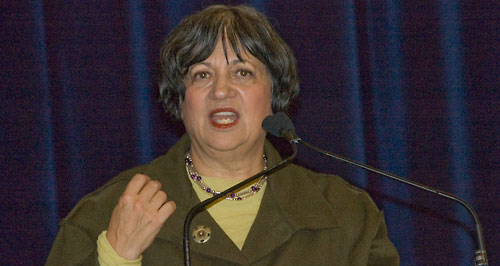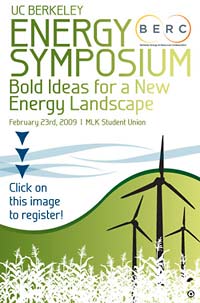 Mary
Nichols, chair of the California Air Resources Board (Cathy
Cockrell/NewsCenter photo)
Mary
Nichols, chair of the California Air Resources Board (Cathy
Cockrell/NewsCenter photo)Energy symposium weighs perils and opportunities on climate change
New economic and political climate figure large in day's discussions
, NewsCenter | 24 February 2009
BERKELEY — While the average Californian now uses about 40 percent less electricity than the average American, we cannot rest on our laurels, Mary Nichols, the chair of the California Air Resources Board, told a gathering at Berkeley on Monday that explored "bold ideas for a new energy landscape." To meet the challenges of global warming — and the state's goal of reducing greenhouse gas emissions to 1990 levels by 2020 — each Californian needs to cut his or her carbon footprint from the current average, 14 tons per year, to 10, she said.
Audio clip ![]()
On sprawl and greenhouse-gas emissions:
California Air Resources Board Chair Mary Nichols discusses a new and little-known California law, which she says is essential to progress on global warming. (37 seconds)
Nichols addressed the third annual UC Berkeley Energy Symposium, where the dangers and opportunities — political, economic, and environmental — of the current moment were a recurring theme. In her keynote address she told more than 500 conferees in Pauley Ballroom that "the time is now to respond to both the economic and environmental imperative to take action." Clean and efficient technologies, she said, can "serve as an engine for a reinvigorated and sustainable economy that will deliver jobs and sustain our quality of life."
While warning that societies often fail "to come to grips with crises," Nichols highlighted opportunities for progress on climate change under the Obama Administration, leveraging California's record of environmental leadership at the national level. The state's landmark Global Warming Solutions Act of 2006 (often referred to as AB32), is one example of its past successes, along with the long-term economic effect of California's energy-efficiency standards, as calculated recently by Berkeley faculty member David Roland-Holst: between 1972 and 2008, $56 billion in electricity-cost savings and the creation of 1.5 million jobs in the state.
Charged with implementing California's climate-change legislation, the California Air Resources Board was stymied by the Bush Administration when it created auto-emissions standards that exceeded federal standards. Barack Obama, in one of his first official acts as President, directed the Environmental Protection Agency to reconsider California's right to set its own auto-emissions standards. "'Consistently California has hit the bar and the rest of the country has followed,'" she quoted the President as saying.

The symposium was presented by the Berkeley Energy & Resources Collaborative (BERC), a student organization. This year's sold-out symposium attracted broad public interest, as engineering and business grad students rubbed shoulders with venture capitalists and utility-industry employees. BERC co-president Sarah Barker-Ball, a Berkeley law student, said a particular goal this year was to stimulate "the hard conversations" by including a wide range of perspectives, including those of the oil and auto industries.
The afternoon keynote address was given by John Hofmeister, former Shell Oil CEO and now head of Citizens for Affordable Energy, a not-for-profit membership organization. Hofmeister said that the notion that the "free market" governs energy supply and demand couldn't be more mistaken. Energy, he said, is the most regulated industry in the world.
Characterizing the current political system for overseeing federal energy policy as dysfunctional beyond repair, he proposed the establishment of an independent Federal Energy Resources Board, which would focus on long-term goals and have broad authority over energy supplies and carbon emissions. Hofmeister said such an entity, modeled after the Federal Reserve Board of Governors, would be more insulated from short term political considerations than current regulators.
The potential for addressing global warming today was discussed explicitly during a session on the "new politics" of energy. "I can't underline enough the difference" between the Obama administration and the Bush administration, which was "rife with climate-change deniers," said panelist Ken Alex, who heads the environment section of the California Attorney General's Office.
On the unraveling of the economy since last year's symposium, and how those events may impact progress on climate change — an issue raised by many — "there's two camps of thought," said Adjunct Profess Andrew Isaacs, moderator of a panel on green building. "One is that it's expensive; there's not the time to do it." The other sees the crisis as "an opportunity to change. You're spending money anyway" so why not aggressively address climate change while you're at it?

